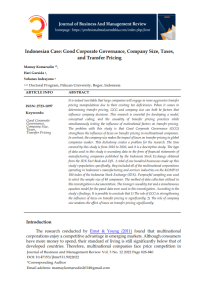Jurnal Internasional S3 IM
Indonesian Case: Good Corporate Governance, Company Size, Taxes, and Transfer Pricing
It is indeed inevitable that large companies will engage in more aggressive transfer pricing manipulations due to their existing tax deficiencies. When it comes to determining transfer pricing, GCG and company size can both be factors that influence company decisions. This research is essential for developing a model, conceptual coding, and the causality of transfer pricing practices while simultaneously testing the influence of motivational factors on transfer pricing. The problem with this study is that Good Corporate Governance (GCG) strengthens the influence of taxes on transfer pricing in multinational companies. In contrast, the company size makes the impact of taxes on transfer pricing in global companies weaker. This dichotomy creates a problem for the research. The time covered by this study is from 2010 to 2020, and it is a descriptive study. The type of data used in this study is secondary data in the form of financial statements of manufacturing companies published by the Indonesia Stock Exchange obtained from the IDX Fact Book and OJS. A total of one hundred businesses made up this study's population; specifically, they included all of the multinational corporations operating in Indonesia's manufacturing and services industries on the KOMPAS 100 index of the Indonesia Stock Exchange (IDX). Purposeful sampling was used to select the sample size of 48 companies. The method of data collection utilised in this investigation is documentation. The Granger causality test and a simultaneous equation model for the panel data were used in this investigation. According to the study's findings, It is possible to conclude that 1) The role of GCG in strengthening the influence of taxes on transfer pricing is significantly; 2) The role of company size weakens the effect of taxes on transfer pricing significantly.
Ketersediaan
Tidak ada salinan data
Informasi Detail
- Judul Seri
-
-
- No. Panggil
-
-
- Penerbit
- : Journal of Business and Management Review., 2022
- Deskripsi Fisik
-
-
- Bahasa
-
- ISBN/ISSN
-
-
- Klasifikasi
-
NONE
- Tipe Isi
-
-
- Tipe Media
-
-
- Tipe Pembawa
-
-
- Edisi
-
-
- Subjek
- Info Detail Spesifik
-
-
- Pernyataan Tanggungjawab
-
-
Versi lain/terkait
Tidak tersedia versi lain
Lampiran Berkas
Komentar
Anda harus masuk sebelum memberikan komentar

 Karya Umum
Karya Umum  Filsafat
Filsafat  Agama
Agama  Ilmu-ilmu Sosial
Ilmu-ilmu Sosial  Bahasa
Bahasa  Ilmu-ilmu Murni
Ilmu-ilmu Murni  Ilmu-ilmu Terapan
Ilmu-ilmu Terapan  Kesenian, Hiburan, dan Olahraga
Kesenian, Hiburan, dan Olahraga  Kesusastraan
Kesusastraan  Geografi dan Sejarah
Geografi dan Sejarah